|
De Engelse schrijver Jonathan Coe werd geboren op 19 augustus 1961 in Birmingham. Zie ook mijn blog van 19 augustus 2010 en eveneens alle tags voor Jonathan Coe op dit blog.
Uit: Rain Before It Falls
“Let me see, now. The caravan itself is half-obscured, in this picture, by overhanging trees. It had been placed, for some reason, in one of the most remote corners of the grounds, and left there for many years. This photograph captures it just as I remember it: eerie, neglected, the woodwork starting to rot and the metalwork corroding into rust. It was tiny, as this image confirms. The shape, I think, is referred to as “teardrop”: that is to say, the rear end is rounded, describing a small, elegant curve, while the front seems to have been chopped off, and is entirely flat. It’s a curious shape: in effect, the caravan looks as though it is only half there. The trees hanging over its roof and trailing fingers down the walls are some kind of birch, I believe. The caravan had been placed on the outskirts of a wood: in fact the dividing line between this wood–presumably common land–and the furthest reaches of Uncle Owen’s property was difficult to determine. A more modern caravan might have had a picture window at the front; this one, I see, had only two small windows, very high up, and a similar window at the side. No surprise, then, that it was always dark inside. The door was solid and dark, and made of wood, like the whole of the bottom half of the caravan–even the towbar. That’s an odd feature, isn’t it?–but I’m sure that I am right. It rested on four wooden legs, and always sat closer to the ground than it should have done, because both the tyres were flat. The windows were filthy, too, and the whole thing gave the appearance of having been abandoned and fallen into irreversible decay. But to a child, of course, that simply made it all the more attractive. I can only imagine that Ivy and Owen had bought it many years ago–in the 1920s, perhaps, when they were first married–and had stopped using it as soon as they had children. Inside there were only two bunks, so it would have been quite useless for family holidays.
How many weeks was it, I wonder, before Beatrix and I set up camp there together? Or was it only a matter of days? They say that split seconds and aeons become interchangeable when you experience intense emotion, and after my arrival at Warden Farm I was soon feeling a sense of loneliness and homesickness which I find it impossible to describe. I was beside myself with unhappiness.”
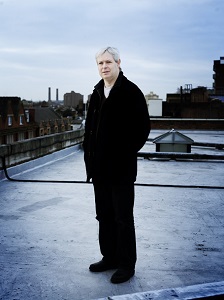
Jonathan Coe (Birmingham, 19 augustus 1961)
De Amerikaanse dichter Li-Young Lee werd geboren op 19 augustus 1957 in Jakarta, Indonesië. Zie ook mijn blog van 19 augustus 2010 en eveneens alle tags voor Li-Young Lee op dit blog.
Arise, Go Down
It wasn't the bright hems of the Lord's skirts
that brushed my face and I opened my eyes
to see from a cleft in rock His backside;
it's a wasp perched on my left cheek. I keep
my eyes closed and stand perfectly still
in the garden till it leaves me alone,
not to contemplate how this century
ends and the next begins with no one
I know having seen God, but to wonder
why I get through most days unscathed, though I
live in a time when it might be otherwise,
and I grow more fatherless each day.
For years now I have come to conclusions
without my father's help, discovering
on my own what I know, what I don't know,
and seeing how one cancels the other.
I've become a scholar of cancellations.
Here, I stand among my father's roses
and see that what punctures outnumbers what
consoles, the cruel and the tender never
make peace, though one climbs, though one descends
petal by petal to the hidden ground
no one owns. I see that which is taken
away by violence or persuasion.
The rose announces on earth the kingdom
of gravity. A bird cancels it.
My eyelids cancel the bird. Anything
might cancel my eyes: distance, time, war.
My father said, Never take your both eyes
off of the world, before he rocked me.
All night we waited for the knock
that would have signalled, All clear, come now;
it would have meant escape; it never came.
I didn't make the world I leave you with,
he said, and then, being poor, he left me
only this world, in which there is always
a family waiting in terror
before they're rended, this world wherein a man
might arise, go down, and walk along a path
and pause and bow to roses, roses
his father raised, and admire them, for one moment
unable, thank God, to see in each and
every flower the world cancelling itself.

Li-Young Lee (Jakarta, 19 augustus 1957)
De Nederlandse schrijver, dichter en vertaler Louis Th. Lehmann werd geboren op 19 augustus 1920 in Rotterdam. Zie ook mijn blog van 19 augustus 2010 en eveneens alle tags voor Louis Th. Lehmann op dit blog.
Fundamenteel
Ik kijk naar mijn broekspijpen en schoenen
terwijl ik ze aan heb,
en verbaas me dat dit ik is.
Ik is vast iets anders.
Maar wat?
Anti-Alphen
Ik heb seeds medelijden
met wollen speelgoedbeesten,
zij kijken uit hun ogen
alsof ze wilden leven.
Ze zijn bijzonder kwetsbaar,
hun wonden helen nooit,
ze zijn nooit werk'lijk dood
en worden toch gegeven
mee aan de vuilnisman.
zo doen nu eenmaal ouders,
dat zijn volwassenen
en nimmer te vertrouwen.
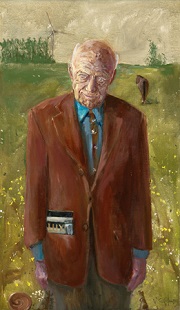
Louis Th. Lehmann (19 augustus 1920 – 23 december 2012)
Portret door Hennie van der Vegt
De Amerikaanse dichter Frederic Ogden Nash werd geboren in Rye, New York, op 19 augustus 1902. Zie ook mijn blog van 19 augustus 2010 en eveneens alle tags voor Ogden Nash op dit blog.
Summer Serenade
When the thunder stalks the sky,
When tickle-footed walks the fly,
When shirt is wet and throat is dry,
Look, my darling, thats July.
Through the grassy lawn be leather,
And prickly temper tug the tether,
Shall we postpone our love for weather?
If we must melt, lets melt together!
The Chipmunk
My friends all know that I am shy,
But the chipmunk is twice and shy and I.
He moves with flickering indecision
Like stripes across the television.
He's like the shadow of a cloud,
Or Emily Dickinson read aloud.
The Camel
The camel has a single hump;
The dromedary , two;
Or else the other way around.
I'm never sure. Are you?
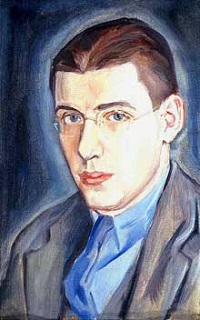
Ogden Nash (19 augustus 1902 – 19 mei 1971)
Portret door Frederick S. Wight , 1933
De Iers-Amerikaanse schrijver Frank McCourt werd geboren op 19 augustus 1930 in New York. Zie ook mijn blog van 19 augustus 2010 en eveneens alle tags voor Frank McCourt op dit blog.
Uit: Teacher Man
“If I knew anything about Sigmund Freud and psychoanalysis I'd be able to trace all my troubles to my miserable childhood in Ireland. That miserable childhood deprived me of self-esteem, triggered spasms of self pity, paralyzed my emotions, made me cranky, envious and disrespectful of authority, retarded my development, crippled my doings with the opposite sex, kept me from rising in the world and made me unfit, almost, for human society. How I became a teacher at all and remained one is a miracle and I have to give myself full marks for surviving all those years in the classrooms of New York. There should be a medal for people who survive miserable childhoods and become teachers, and I should be first in line for the medal and whatever bars might be appended for ensuing miseries.
I could lay blame. The miserable childhood doesn't simply happen. It is brought about. There are dark forces. If I am to lay blame it is in a spirit of forgiveness. Therefore, I forgive the following: Pope Pius XII; the English in general and King George VI in particular; Cardinal MacRory, who ruled Ireland when I was a child; the bishop of Limerick, who seemed to think everything was sinful; Eamonn De Valera, former prime minister (Taoiseach) and president of Ireland. Mr. De Valera was a half-Spanish Gaelic fanatic (Spanish onion in an Irish stew) who directed teachers all over Ireland to beat the native tongue into us and natural curiosity out of us. He caused us hours of misery. He was aloof and indifferent to the black and blue welts raised by schoolmaster sticks on various parts of our young bodies. I forgive, also, the priest who drove me from the confessional when I admitted to sins of self-abuse and self-pollution and penny thieveries from my mother's purse. He said I did not show a proper spirit of repentance, especially in the matter of the flesh."
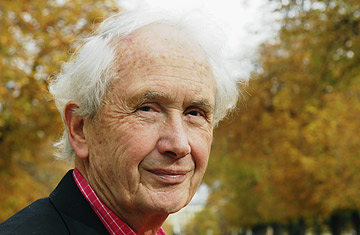
Frank McCourt (19 augustus 1930 – 19 juli 2009)
De Vlaamse dichter Frederik Lucien De Laere werd geboren in Brugge op 19 augustus 1971. Zie ook mijn blog van 19 augustus 2010 en eveneens alle tags voor Frederik Lucien De Laere op dit blog.
Hoorn
De balts in de pas, lonkend
naar de fonkelende ogen
van het schichtig wijfje,
met een gewei wijds
vertakkend zich
tot bronstig netwerk.
Het hoofdschuddend pronken
met de uitstekende conditie
treft doel: een haard, een harem
clustert zich rond hem, hij
die het gevaar verkent.
Hij die op den duur status
koppelt aan grotesk, zijn toorn
laat varen en zijn macht
aan de hoorns hangt,
spijts het overgrote ego.
Filoktetes
De vriendschap had geen gelijke
zoals hij daar hand in hand bij de brandstapel stond
met een held die het vuur als verlossing koos
en hem een boog met gifpijlen schonk, als laatste gift.
Bijna vond hij zijn einde, insgelijks,
op het eiland onderweg
waar een slang beet in zijn voet:
ondraaglijk was de stank, het leed,
de boete en de eenzaamheid.
Een held komt, een wonder geschiedt
en de geschiedenis wordt herschreven
als het orakel in daden wordt vertaald
en hij vele levens neemt, een non-stop
sneuvelen bij de halsstarrige stad.
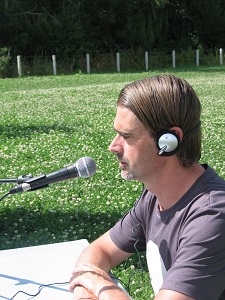
Frederik Lucien De Laere (Brugge, 19 augustus 1971)
De Engelse toneelschrijver, dichter en criticus John Dryden werd geboren op 19 augustus 1631 in Aldwinkle (Northamptonshire). Zie ook mijn blog van 19 augustus 2010 en eveneens alle tags voor John Dryden op dit blog.
Can Life Be A Blessing
Can life be a blessing,
Or worth the possessing,
Can life be a blessing if love were away?
Ah no! though our love all night keep us waking,
And though he torment us with cares all the day,
Yet he sweetens, he sweetens our pains in the taking,
There's an hour at the last, there's an hour to repay.
In ev'ry possessing,
The ravishing blessing,
In ev'ry possessing the fruit of our pain,
Poor lovers forget long ages of anguish,
Whate'er they have suffer'd and done to obtain;
'Tis a pleasure, a pleasure to sigh and to languish,
When we hope, when we hope to be happy again.
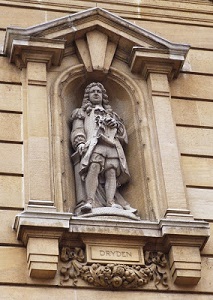
John Dryden (19 augustus 1631 – 12 mei 1700)
Standbeeld aan de Northampton Public Library
Zie voor nog meer schrijvers van de 19e augustus ook mijn blog van 19 augustus 2011 deel 2 en ook mijn blog van 19 augustus 2010.
|



